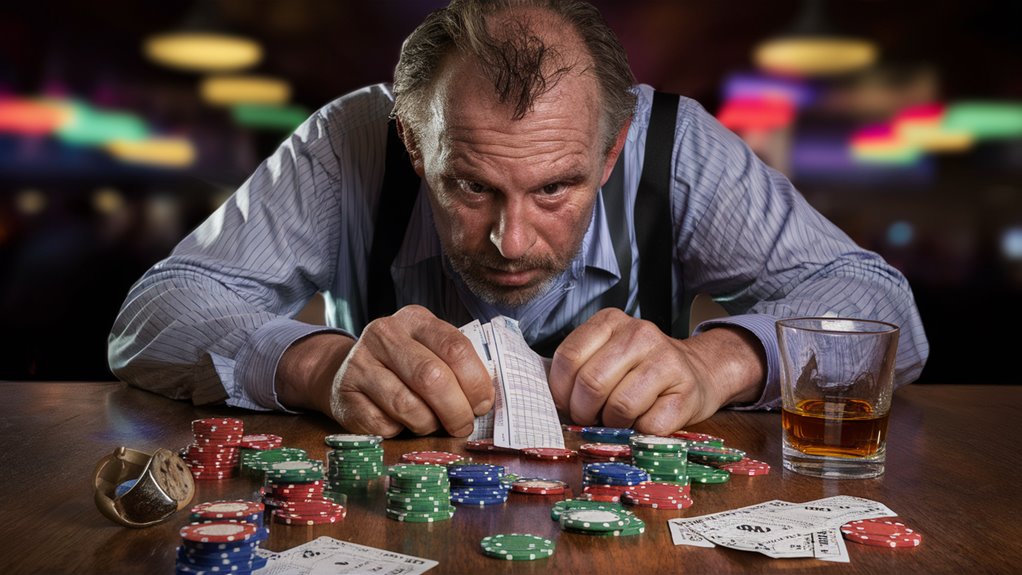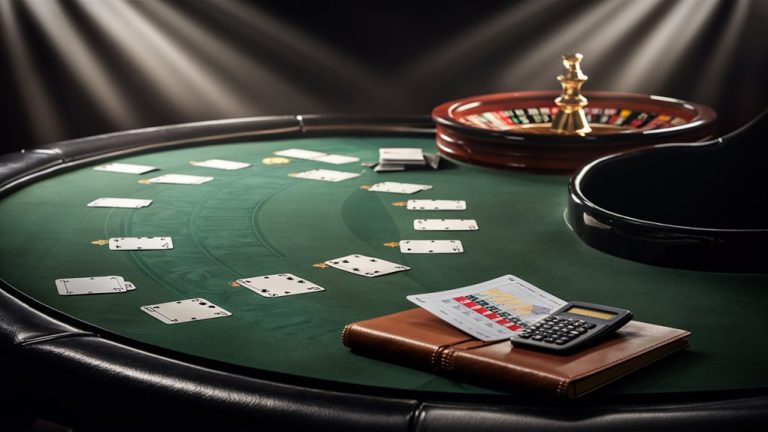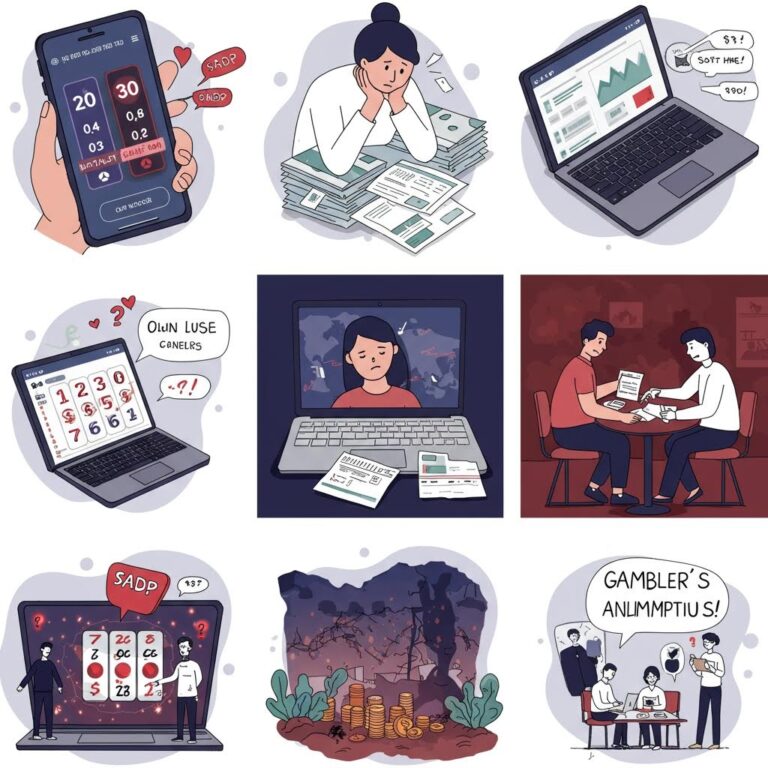
Origins of Problem Gambling Psychological Effects for Understanding
The impulsive conduct sparks definite interruptions in the dopamine systems, matching a pattern familiar to substance dependence disorder. When on top of everything, 75% of people with gambling disorders have clinical depression symptoms, ruggedly illustrating how deeply someone who is addicted to gambling impacts their psychological wellness, as well as vice versa.
Problem Gambling and Neurological Impact
The circuits of reward in the brain and decision-making capabilities are severely damaged throughout prolonged gambling habits. The neurological malfunction leads to increasingly reckless betting behavior as well as continuous chasing of losses, regardless of what negative consequences may be forthcoming. The altered brain chemistry creates a cycle of addictive behavior that becomes exceedingly hard to break without professional help.
Problem Gambling Impacts the Wider Population
The mental health impact goes far beyond the individual gambler, causing entire families and society as a whole to pay. Common side effects include such things as why people continue gambling despite all the pain.
Treatment Options for All Problem Gamblers
Although the effects are severe for problem gambling, there are evidence-based treatments that offer a way to recover. Cognitive behavioral therapy (CBT) shows particular effectiveness in treating gambling disorders. Counseling services for professionals and support groups provide the crucial tools for gamblers as well as their families, ensuring long-term recovery and restoration related to psychological wellness.
Understanding Problem Gambling Behaviors
Signs of Warning and Manifestations
Problem gambling, which affects millions around the world, is marked by an uncontrollable urge to gamble despite severe negative consequences.
- Chasing losses through mounting bets
- Deception about gambling activities
- Financial desperation turning to borrowed funds
- Increasingly entrenched addiction from episodic betting to compulsive habits
Neurobiological Foundations
The neural mechanisms involved in gambling addiction resemble those of substance dependency.
- Activation of the dopamine system during episodes of betting rewards
- Reinforcement of addictive patterns in the reward circuit
- Neurobiological changes affecting decisions
- Anxiety and depression as comorbid conditions
Risk Factors and Triggers
Biological and Personal Factors
In the development of gambling addictions, genetic predisposition to addictive behavior and early gambling exposure during formative years may play significant roles. Psychological etiology of the illness and behavioral patterns themselves, trauma history, and resultant individual vulnerability, as well as personality traits such as impulsivity, are key factors.
Environmental Influences
- Availability of gambling platforms
- Economic pressures that augment gambling risks
- Social isolation helps create addictive patterns
- The proliferation of online gambling, which enables access 24 hours a day
Prevention and Intervention Strategies
Once the pieces of the puzzle are understood, there can be:
- Methods built on evidence
- Protocols for early detection
- Preventive measures
- Means of support to help impacted persons
This integrated approach takes account of both immediate symptoms and the roots of problem gambling behavior.
The Relationships of Depression and Anxiety
Understanding Depression and Anxiety Relationships in Problem Gambling
Extensive research in selected European Flicker-Frost Slots countries has now indicated that there is a complex bidirectional relationship between problem gambling and mental illness, which can significantly impact the well-being of those affected. Research suggests that up to 75% of those with gambling disorders suffer from pronounced depressive symptoms, testimony to the deep connection between these two conditions.
Depression’s Role in Gambling Behavior
In problem gambling patients with clinical depression, several prominent indicators are manifested:
- Unremitting sadness
- Loss of interest in previously pleasurable activities
- Sense of worthlessness
- Decreased performance
- Sleep disturbances
Anxiety Patterns in Problem Gambling
Anxiety disorders are frequently associated with gambling behavior, which leads to distinguishable modes of onset and reactions:
- Enhanced panic responses in the gamble itself
- In the downtime before gambling starts
- Emotional flutterings after gambling is over
- Anxiety about possible losses soon after
The Reinforcement Cycle
Addiction to gambling creates a vicious circle of its own where:
- After entering depression, gambling is used as an escape from this chronic medical condition—and so feeds back on itself.
- Bet losses will therefore add to the problems of depressive symptoms.
- Such depression causes increasing amounts of worrying and gloominess in everyday life due to the chronic gambling habit that must be sustained without money.
- Chasing investment losses becomes a way to cope.
Treatment Implications
Effective intervention needs to comprise:
- Treatment approaches
- Dual diagnosis
- Cognitive-behavioral psychotherapy
- Anxiety management
- Depression screening for gamblers
The interrelated relationship between gamblers, depression, and anxiety disorders makes it vital to have all-encompassing treatment strategies simultaneously for these mental illnesses directly related to gambling addiction.
Breaking the Addiction Cycle

Evidence-Based Recovery Strategies
Triggers of gambling addiction must be identified to get out of problem gambling. Successful recovery involves finding and breaking the cycle at multiple strategic intervention points.
Personal Triggers and Patterns Identification of Personal Triggers
Personal addiction triggers can manifest in various ways:
- Emotional triggers
- Financial triggers
- Environmental cues
- Social interactions
Recovery Strategies
Cognitive-Behavioral Interventions
Recovery techniques that get results are based on evidence:
- Mindfulness exercises
- Urge-wise counsel
- Cognitive reprocessing
- Habit re-learning
Setting Up Protective Barriers
There are minimum protections against addictions that should include:
- Self-exclusion services
- Financial controls
- Accountability agreements
- Environmental adjustments
Constructing Support Systems
There needs to be recovery support systems that include:
- Professional counseling
- Support by peers, who have been through it themselves
- Family therapy
- Recovery coaching
Developing Healthy Alternatives
Healthy stimuli can include such Willow-Shade Casino alternative activities as:
- Physical exercise
- Gratify their tastes for skills-based hobbies
- Social embrace
Recovery success rates dramatically increase when these structured intervention strategies, accompanied by a consistent support network and behavioral modifications, are employed. This approach tackles both the immediate crisis (addiction control) and the future strategy for lasting recovery.
Family and Marital Effects of Gambling Addiction
Emotional Financial Strain on Families
When contact exists between the addict and his family, gambling inevitably leads to family-destroying consequences. Far-reaching fallout affects a household on its most fundamental level, and among them all are the household dynamics to which a gambling addict’s own reclusion pits our feeling of what is fair or unfair.
Spouses and partners often bear an unbearable financial burden. There is persistent anxiety lurking in the back of their minds over liabilities not yet disclosed and savings that have now been depleted from gambling debts owed to failed businesses.
Children growing up in a family where one or both parents are problem gamblers may receive significant emotional neglect. Growing up starts to turn into a chore and the joy in living is taken away from them because their parents—role models for behavior—do not care where or when this can occur.
Eroded Trust and Fractured Relationships
The breach of trust is at the root of the problem between gambler and spouse, who may have to put up with many years of lies about gambling and dishonesty surrounding money.
Often with partners experiencing symptoms of traumatic stress including:
- Hypervigilance about financial matters
- Relationship trust takes more effort to maintain
- Rates of depression and anxiety are higher
- Stress-related illnesses become increasingly prevalent
Recovery and Family Treatment Strategies
Successful recovery from addiction must be accompanied by broad-nailed family treatment. This includes:
- Family group sessions to restore communication
- Financial counseling for family members who have been affected
- Spouse and child support groups
- Trust-building exercises
- Professional advice relating to trauma in relationships
The path to healing involves not only changing your behavior but also communicating about money openly and bringing in professionals to repair family bonds damaged by the addiction. Recovery interventions should target not only a person’s individual addiction patterns but also the family systems in which he or she is enmeshed.
Recovery and Support Resources for Gambling Addiction
Professional Help Options
The key to successful recovery is professional gambling counseling. Certified gambling counselors carry out comprehensive assessments and then draw up treatment plans to meet individual needs and preferences. Their job includes identifying potential triggers for gambling relapse, establishing healthy coping mechanisms, and handling conditions of mental illness that may be feeding addictive behaviors.
Support Group Systems
Gamblers Anonymous, Open from 8 AM to 4 PM (GA), provides important peer support by working with structured 12-step recovery programs throughout every part of the group process. Members benefit from shared experiences and mutual understanding, building a solid support network in the process.
In the gamblers recovery model comprising of either GA and professional therapy procedures, we propose that both psychological and social aspects be addressed.
Crisis Support and Immediate Assistance
The national problem gambling helpline (1-800-521-1700) offers 24/7 crisis intervention and referral services. This vital resource area bridges the gap between individuals and:
- Local treatment centers
- Emergency support services
- Self-exclusion policies and programs 토토사이트 순위
- Financial counseling initiatives
- Rehab information
Prevention and Maintenance Tools
Casino and online self-exclusion schemes are vital technical measures. Together with cognitive behavioral therapy (CBT), they enable problem gamblers to:
- Identify gambling triggers
- Develop healthy coping mechanisms
- Learn practical money-management skills
- Become secure again in life
- Abstain
Evidence-Based Treatment Methods
Recent statistics show that cognitive behavioral therapy (CBT) treatment programs specially designed for gambling disorders are highly successful. These structured interventions include:
- Identification of destructive thought patterns
- Development of stress management techniques
- Approaches for relieving anxiety through exercise or progressive relaxation skills
- Building up anti-relapse techniques
- Strengthening the support system




